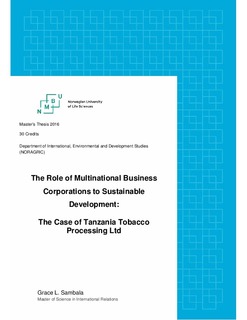| dc.description.abstract | There is a certain tension between MNCs and the local environment where these MNCs operate.
Depending on where in the world the company acts, where it sells and produces its products,
frequently there are different culture, values, beliefs and social patterns. To overcome the tension
between the two actors, principles and codes of conduct can be seen as a response to reduce this
tension between the communities and companies. Most of MNCs have principles on Corporate
Social Responsibility (CSR), where they have to help the communities in development process.
The main objective of this study is to examine the role of multinational corporations on sustainable
development with the specific focus on Tanzania Tobacco Processing Company (TTPL). The
study was conducted in Morogoro municipality and Sikonge district in Tabora region. The study
approaches were both qualitative and quantitative. The respondents were 100 in number. They
were approached to give the required information through questionnaires and interviews.
The study looked at how TTPL helps the community to achieve sustainable development through
CSR. In exploring the efforts made by TTPL to figure out and maintain sustainable development,
the study explore first on how TTPL helps to sustain the wellbeing of its employees. It was found
that TTPL invested in its employees by increasing human capital and in the society through
commitments to Corporate Social Responsibility. It was revealed to the study that TTPL increased
human capital through job rotation, mentoring, coaching, job context, job content and job
enrichment. The increased human capital resulted to employees’ motivation something essential
for improving organisation performance. The CSR extended to community’s health, education and
environmental sectors. In these areas, TTPL had established development projects for the good of
the communities in which it was operating.
However, it was found that there were little and inactive participation and involvement of the
community members in the established development projects especially in the early stages of the
projects. TTPL involve community leaders who act as the representatives of the whole community
during the decision-making process. These community leaders do not have any say in this
meetings; they attend just to bring feedback to the community. The inactive or low participation of the community members is dangerous to the sustainability of the established and implemented
projects. For the projects to be sustainable community members must be involvement right from
the beginning of the project this is due to the fact that, it is the society members who know what
they need the most when it comes to poverty eradication. | nb_NO |

